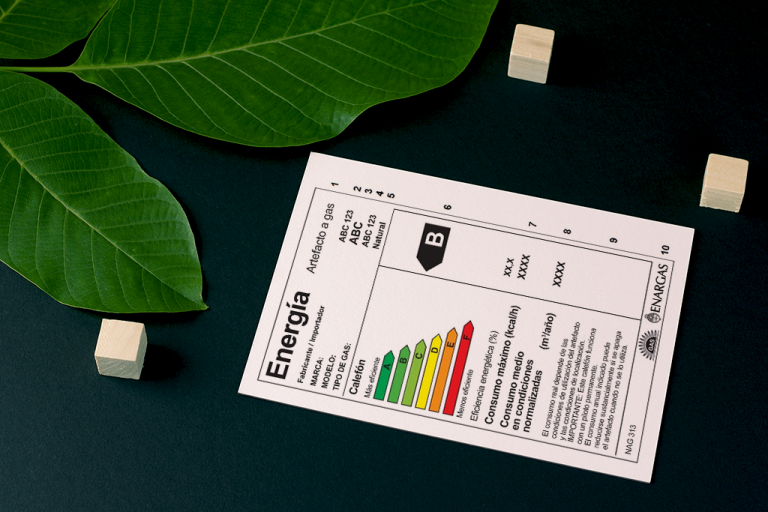You’ve probably heard about the energy performance certificate, but did you know that it is a mandatory document when renting or selling your house in Spain? If you want to know what it is for or how to obtain the energy certificate, this post is for you.
-
What is the energy performance certificate and what is it for?
-
What is the energy label?
-
How can I get the energy certificate?
-
How long does it take to issue the energy performance certificate?
-
When is the EPC mandatory?

What is the energy performance certificate and what is it for?
The energy certificate or EPC is a document that details the energy-related characteristics of a home, such as energy consumption or CO2 emissions. It is calculated taking into account normal conditions of occupation, that is, the normal use that a person would make of their home. It expires after ten years, and generally includes advice to reduce spending.
At a minimum, the EPC should reflect:
- Identification of the building, including its cadastral reference.
- Procedure chosen to obtain the energy rating.
- Regulations on energy saving and efficiency applicable at the time of construction.
- Description of the energy-related characteristics of the building.
- Energy performance rating of the building, reflected in the energy label.
- Recommendations to improve the performance of the building.
- Description of the checks carried out during the qualification phase.
- Compliance with the environmental requirements required for thermal installations.
As we have already mentioned, when selling a home, with some exceptions, it is a mandatory document as regulated by Real Decreto 235/2013 del 5 de abril.
When buying a home is an interesting document to consider, as it will help you get an idea of the energy spending you’ll make a year.
What is the energy label?
The energy label is obtained from the energy certificate, and it specifies the qualification obtained by the house with a scale of letters and colors ranging from G (red, minimum energy efficiency), to A (dark green, maximum energy efficiency).
Although getting a grade of G may be something that seems worrying, there are no legal consequences for it; the law only obliges to have the certificate, without repercussions regardless of the qualification obtained.

How can I get the energy certificate?
The law stipulates that the EPC has to be done by a certified technician, be it an architect or an engineer, but there is no obligation to hire someone in particular. There is no stipulated price, although normally the cost will include the visit to the house and data collection, measurements, suggestions for improvement measures, and registration fee in the agency in charge.
The user is free to compare budgets and professionals and decide who they want to hire, however, if you have the help of a real estate agency, they probably have a trusted professional to manage the certificate.
How long does it take to issue the energy performance certificate?
Once the technician has made the visit and checked the house, they gather all the data obtained and enter it into a computer program that gives them the result of the energy rating. After that, the computer generates the certificate, which must be registered with the responsible body, which changes according to each Autonomous Community.
In the case of Comunidad Valenciana, and therefore of Torrevieja, the EPC has to be registered through the Valencian Institute for Business Competitiveness, or IVACE, which absorbed the powers of the Valencian Energy Agency in 2013. This is a completely electronic process, so the label is generated instantly.
In total, in the case of Comunidad Valenciana, the process should not take more than five days.

When is the EPC mandatory?
As a general rule, if you sell or rent your house in Spain, the energy certificate is mandatory. Not having it, or having an expired one (as I’ve already mentioned, this happens after ten years) when the sale or rental of a property is announced, can mean a penalty of 300 to 6,000 euros.
There are very few cases in which the EPC isn’t necessary. The law says the following:
2. Excluded from the scope of application
a) Buildings and monuments officially protected as part of a declared environment or because of their particular architectural or historical value.
b) Buildings or parts of buildings used exclusively as places of worship and for religious activities.
c) Provisional constructions with an expected period of use equal to or less than two years.
d) Industrial, defense and agricultural buildings or parts thereof, in the part intended for workshops, industrial, defense and non-residential agricultural processes.
e) Buildings or parts of isolated buildings with a total useful area of less than 50 m².
f) Buildings that are purchased for major renovations or demolition.
g) Buildings or parts of existing buildings of houses, whose use is less than four months a year, or for a limited time per year and with an expected energy consumption of less than 25 percent of what would result from their use during all the year, as long as this is confirmed by the responsible declaration of the owner of the home.
The last point may be interesting for those who are looking to rent their house in a holiday period, but there’s a caveat; even if the house is going to be rented for less than 4 months, it might spend more than 25% of annual consumption due to the type of construction. The study that must be done to demonstrate that a holiday rental property should be exempt from having an energy performance certificate is as exhaustive or more than what is needed to obtain the EPC, so we recommend obtaining the certificate instead.







Leave a Reply